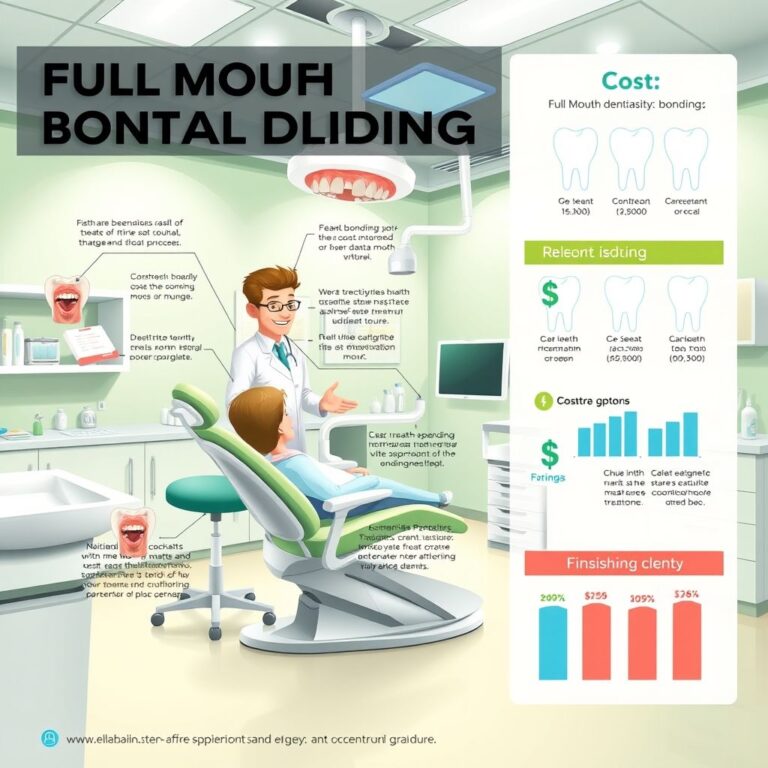Unveiling the Mystery: Dental Bonding Costs with Insurance – A Comprehensive Guide
A dazzling smile is a powerful asset, boosting confidence and making a lasting impression. Yet, chipped teeth, gaps, or minor discolorations can hold you back from achieving that perfect grin. Dental bonding emerges as a popular solution, offering a quick and relatively affordable way to restore your smile’s beauty. But with dental procedures often shrouded in cost uncertainty, navigating the world of bonding with insurance can feel overwhelming. Fear not! This in-depth guide peels back the layers, unveiling everything you need to know about dental bonding costs with insurance.

The Art of Dental Bonding: A Quick Primer
Before diving into the intricacies of insurance coverage, let’s establish a clear understanding of dental bonding itself. This cosmetic dentistry procedure utilizes a tooth-colored resin material meticulously sculpted and adhered to the tooth’s surface. The dentist meticulously shapes the resin to seamlessly blend with your existing teeth, effectively concealing chips, cracks, gaps, minor misalignments, and even some types of discoloration. The entire process is typically completed in a single visit, making it a convenient option for busy schedules.
The Cost Spectrum: Unveiling the Price of a Perfect Smile
Dental bonding, while generally less expensive than other cosmetic dentistry procedures like veneers or crowns, doesn’t come with a one-size-fits-all price tag. The cost can vary significantly depending on several factors:
- Complexity of the Procedure: A simple chip repair on a front tooth will naturally cost less compared to a complex procedure involving multiple teeth or significant reshaping of the resin.
- Dentist’s Expertise and Location: The dentist’s experience and qualifications, along with the geographical location of the practice, can influence the cost. Dentists in high-demand areas might charge more.
- Material Quality: The type of resin used can impact the price. Higher-quality, more durable resins may cost slightly more upfront but offer better longevity.
Here’s a table outlining a general range for dental bonding costs:
| Complexity of Procedure | Cost per Tooth (USD) |
|---|---|
| Simple chip repair | $100 – $200 |
| Moderate repair (larger chips or minor gaps) | $200 – $400 |
| Complex repair (extensive damage or multiple teeth) | $400 – $600+ |
The Insurance Factor: Can It Lighten the Load?
Now, let’s address the burning question: how does dental insurance play a role in dental bonding costs? Here’s what you need to understand:
- Insurance Focus: Dental insurance plans primarily focus on preventive and restorative care, aiming to maintain good oral health. Cosmetic procedures often fall outside this scope.
- The Necessity Clause: If the dental bonding addresses a functional issue, like repairing a chipped tooth that affects biting or chewing, your insurance might offer some coverage. However, purely cosmetic bonding for improving aesthetics typically isn’t covered.
- Understanding Your Plan: The extent of coverage for procedures deemed “necessary” varies significantly between plans. It’s crucial to meticulously examine your specific dental insurance policy to understand what’s covered and the percentage of the cost they’ll reimburse.
Maximizing Coverage: Getting the Most Out of Your Insurance
While insurance coverage for purely cosmetic bonding might be limited, there are ways to leverage your plan and potentially reduce your out-of-pocket expenses:
- Consult with Your Dentist: Discuss your dental bonding goals with your dentist. They can help determine if there’s a functional aspect to the procedure that your insurance might cover. For example, a chipped tooth that affects biting could be classified as restorative, increasing your chances of coverage.
- Pre-Treatment Approval: Some insurance plans require pre-treatment approval before covering specific procedures. Ensure you get the green light from your insurance provider before undergoing dental bonding.
- Alternative Options: If your insurance doesn’t cover cosmetic bonding, explore alternative solutions. Teeth whitening might address minor discoloration, while orthodontic treatment could correct misalignments. Discuss these options with your dentist to determine the most suitable approach.
Beyond the Numbers: Additional Considerations
Remember, cost isn’t the sole factor to consider when it comes to dental bonding. Here are some additional aspects to keep in mind:
- Durability: Dental bonding, while effective, isn’t a permanent solution. The resin can chip or stain over time, necessitating repairs or replacements. Factor in the potential for future maintenance costs when making your decision.
- Alternatives: Explore other cosmetic dentistry options like veneers or crowns. While potentially more expensive upfront, they might offer greater durability. Discuss these options with your dentist to determine the best fit for your needs and budget.
- Finding the Right Dentist: Choose a qualified and experienced dentist who specializes in cosmetic dentistry. Their expertise can ensure a successful
Financing Your Smile: Exploring Payment Options
Even with insurance coverage, some out-of-pocket costs might remain. Here are some financing options to consider:
- CareCredit or Similar Medical Credit Cards: These specialized credit cards offer financing specifically for medical and dental procedures. They often come with promotional periods with 0% interest, allowing you to spread out the cost over time.
- Dental Payment Plans: Many dental practices offer in-house payment plans, enabling you to make manageable monthly payments towards your dental bonding procedure.
- Personal Loans: Consider a personal loan from a bank or credit union to cover the cost of dental bonding. However, carefully evaluate the interest rates and terms to ensure it’s a financially sound decision.
FAQs: Demystifying Dental Bonding Costs
- Will my dental insurance cover the entire cost of bonding?
In most cases, no. Insurance typically covers procedures deemed medically necessary, not purely cosmetic enhancements. However, if the bonding addresses a functional issue (e.g., repairing a chipped tooth affecting biting), there might be some coverage.
- How much does dental bonding usually cost with insurance?
This depends on your specific insurance plan and the percentage they cover. The remaining cost, after insurance reimbursement, becomes your out-of-pocket expense. It can range from a few hundred dollars to the full cost of the procedure if there’s no coverage.
- Is dental bonding worth the cost?
Dental bonding offers a relatively affordable way to achieve a more aesthetically pleasing smile. It’s a good option for minor repairs and enhancements. However, consider factors like durability and potential for future costs when making your decision.
- What are some alternatives to dental bonding?
Teeth whitening can address minor discoloration. Porcelain veneers offer a more durable solution for chipped teeth or gaps but are typically more expensive. Orthodontic treatment can correct misaligned teeth. Consult with your dentist to explore the most suitable option for your needs and budget.
- How can I find a qualified dentist for dental bonding?
Look for dentists who specialize in cosmetic dentistry and have experience with dental bonding procedures. Ask your dentist about their experience, qualifications, and before-and-after photos of their bonding work. Reading online reviews and checking with friends or family for recommendations can also be helpful.
Conclusion
Dental bonding offers a valuable solution for restoring a chipped, gapped, or discolored smile. While the cost can vary depending on complexity and location, understanding your insurance coverage and exploring financing options can make this procedure more accessible. Remember, a dazzling smile is an investment in your confidence and well-being. By carefully considering the cost factors, consulting with your dentist, and exploring all options, you can achieve the beautiful smile you deserve.
You might also want to check out these articles for more ideas: dental bonding front teeth gap cost


